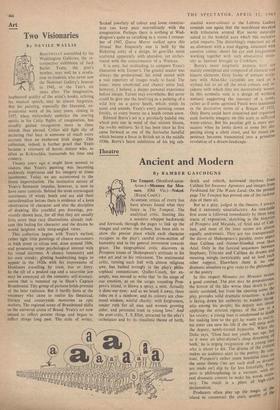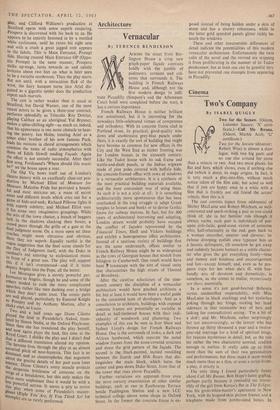Theatre
Ancient and Modern
By BAMBER GASCOIGNE
The Tempest. (Stratford-upon- Avon.)—Measure for Mea- sure. (Old Vic.)—Naked. (Royal Court.)
ACADEMIC critics of every hue have always found what they fancy in The Tempest. The analytical critic, hunting like a sensitive whippet backwards and forwards through the pages to link up the images and corner the echoes, has been able to show the precise place which each character occupies in the play's careful cross-section of humanity and in the general movement towards grace. The biographical critic discovers in Prospero traces of Shakespeare's atttitude to his own art and to his retirement. The sentimental critic, turning each leaf with almost religious awe, has bathed lovingly in the play's philo- sophical romanticism; Quiller-Couch, for ex- ample, was moved to write that 'in the surge of our emotion, as on the surges rounding Pros- pero's island, is blown a spray, a mist. Actually it dims our eyes: and as we brush it away, there rides on it a rainbow; and its colours are chas- tened wisdom, wistful charity; with forgiveness, tender ruth for all Men and women growing older, and perennial trust in young love.' And the poet-critic, 1'. S. Eliot, attracted by the play's techniques and by its ritualistic theme of birth,
death and rebirth, borrowed rhythms from Caliban for Sweeney Agonistes and images from Ferdinand for The Waste Land. On the printed page The Tempest has proved one of the luckiest dips of them all. But as a play, judged in the theatre, 1 atways find it extremely unsatisfactory. An unactable first scene is followed immediately by three long tracts of exposition, sketching in the histories of Prospero and Miranda, of Ariel and of Cali- ban, and most of the later scenes are almost equally undramatic. They are too transparentlY abject than slaves of Shakespeare's parable, more a hi than Caliban and thinner-blooded even than Ariel. Only in the farcical sequences between Stephano, Trinculo and Caliban do drama and meaning mingle inextricably and so lend each other support. Elsewhere there is no real dramatic situation to give roots to the philosoPhY or the poetry. In this respect Measure jor Measure makes a good contrast. The plot may be preposterous, the horror of the fate worse than death is cer- tainly outdated, but from the opening scene the play provides solid dramatic situations: a duke is laying down his authority to wander ineng: nito among his people; his deputy sets abolo applying the strictest rigours of the law to lax society; a young man is condemned to &am for making love to the girl he wants to rnall.,Y.; his sister can save his life if she will sleep with the deputy, newly-turned hypocrite. When the Duke says, 'Thou hast nor youth, nor age. byt as it were an after-dinner's sleep dreaming ti,.` both,' he is urging resignation on a young rha"t who is about to die. The drama of the coat° makes an audience alert to the poetry. BY coil; trast, Prospero's rather more beautiful lines c) the same theme ('we are such stuff as drearn" are made on') slip by far less forcefully. Pr050 pero is philosophising in a vacuum, with 11 real dramatic context to make his words il's; sary. The result is a piece of high-1 a declamation. f the
Producers often play up the magic 0 the island to counteract the static quality of play, and Clifford Williams's production at Stratford opens with some superb conjuring. Prospero is discovered with his back to us. He appears to be entirely hemmed in by a mottled White cyclorama, until he raises his right arm and with a crash a great jagged rent appears in the fabric. This is Main Entrance, Prompt Side. Having created Main Entrance OP (Oppo- site Prompt) in the same manner, Prospero stalks up-stage, turns towards us and calmly levitates about two feet on what is later seen to be a variable mushroom. Then the play starts. But not until, with a miraculous flick of the wrist, the fairy banquet turns into Ariel dis- guised as a gigantic spider does the production repeat such marvels.
The cast is rather weaker than is usual at Stratford, but David Warner, one of the most recent actors to be given a three-year contract, performs splendidly as Trinculo. Roy Dotrice, Playing Caliban as an aboriginal Yul Brynner, makes a spine-chilling sight—so much so, indeed, that his appearance is one more obstacle to hear- ing the poetry. Ian Holm, treating Ariel as a sober elder brother of his now famous Puck, leads his minions in choral arrangements which Combine the tones of radio atmospherics with
those of Edith Sitwell reading Façade. Again the effect is not entirely successful. After their first song, Ferdinand's 'Where should this music be?' set the house upon a roar.
The Old Vic bows itself out of London's theatre history with an excellently clear-cut pro- duction by Michael Elliot of Measure for Measure. Malcolm Pride has provided a beauti- ful and most intricate set, a maze of secret areas and different levels which cries out for a game of hide-and-seek; Richard Pilbrow lights it With superb subtlety; and Michael Elliot uses it for some very imaginative groupings. While the wits of the town chatter, a bunch of beggars lurk in the shadows clacking their boxes; a crowd peers through the grille of a gate at the
final judgment scene. On a more open set these _touches might seem obtrusive and obvious.
Here they are superb. Equally tactful is the vague suggestion that the final scene stands for the Day of Judgment itself, with the Duke in cardinal's red entering to ecclesiastical music in front of a great sun. The play will support this if it isn't overstressed—and if it turns deputy Angelo into the Pope, all the better. Lee Montague gives a sternly powerful per- formance as Angelo, though he and some of the Others tended to rush the more complicated
sPeeehes, rather like men dashing over a bridge Which they don't quite trust. The comic parts
are well played, particularly by Esmond Knight as Pompey and by Anthony Morton, after a Shaky start, as Lucia.
Two and a half years ago Diane Cilento Played the lead in Pirandello's Naked, trans-
lated by Simon Nedia, at the Oxford Playhouse.
Stoce then she has translated the play herself, and now again plays the lead, this time at the R. oyal Court. I dislike the play and I didn't find that a different translation altered my opinion. e heroine lives through the play at an almost un varied pitch of near-hysteria. This fact is so dominant and so claustrophobic that argument
about the precise details of her past soon loses interest. Diane Cilento's every muscle projects the desperate brittleness of someone on the , of a breakdown, but this only makes the Piece more unpleasant than it would be with a less powerful actress. It seems a pity to revive this
• Play when some of Pirandello's master- Pieces (Right You Are, If You Think Sol for example) are so rarely performed.



































 Previous page
Previous page